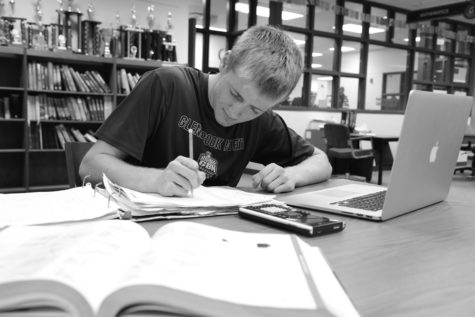Athletics lead to academic success

Due to the time spent at practices and games for sports, some athletes believe their grades will drop when in season because they have less time for schoolwork.
Junior Josh Kazan said he found the opposite to be true, often procrastinating when he was out of season for soccer and not starting his homework until four to five hours after coming home. During the soccer season, he was more motivated to do homework because he had less time to get it done.
“As soon as I [got] home from a game, I went to start my work,” said Kazan. “Whereas out of season, I often just sit around for a couple of hours before starting [homework], which sometimes leads to me staying up later, and that can lead to worse performances on quizzes and tests.”
In a study conducted by Angela Lumpkin, professor and department chair for Kinesiology and Sports Management at Texas Tech University, a relationship was found between participation in sports and higher academic performance for high school students in Kansas based off of standardized test data she had access to. Causation could not be proven because it was statistically impossible to measure correlation due to too many variables that contribute to academic performance.
According to the study, Lumpkin found that athletes who participate in sports tend to have lower dropout rates, slightly higher standardized test scores, higher graduation rates and higher GPAs.
Lumpkin said one major reason the relationship exists is because, in almost every state, there is a law that requires athletes to maintain a certain GPA to be eligible for competition, which forces them to take their studies more seriously.
Junior Daniel Spencer said he noticed his involvement in sports improves his academic productivity.
“I think [playing sports] helps with [eliminating] procrastination because you’re under a little more pressure, and you don’t have as much time to procrastinate because you kind of [have to] get [homework] done right when you get home,” Spencer said.
David Vincent, boys cross country coach and social studies teacher, said he believes the physical activity involved with sports can help stimulate brain activity which would help increase alertness in the classroom.
“I think that if you are physically healthier, there’s every reason to believe that it would stimulate brain activity and get you a better night sleep,” Vincent said.
Lumpkin said even though there was a relationship between sports and better academic performance, it does not pertain to everyone.
Junior Stephanie Suh said when she was in season for golf, her grades dropped.
“Every year, I prepare myself for my grades to drop during the fall because golf takes away so much time and energy,” Suh said.
Although Spencer said sports made him tired, they had a positive impact on his academic performance overall, especially with being on time.
“At a younger age, [being on time] wasn’t as big of a deal because the coaches weren’t as strict, but when you get bumped up to middle school and now high school, being on time [in sports] is one of the biggest parts, and I think that carries over to school too,” said Spencer. “You have to be on time. You [have] to turn in your assignments on time. You have to be in class on time. So, I think that kind of really carries over.”

